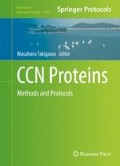Abstract
CCN2 is a profibrotic matricellular protein. CCN2 directly promotes cell adhesion and indirectly promotes fibrosis by activating adhesive signaling in response to growth factors, cytokines, and extracellular matrix. The following protocols will allow the direct assessment of other CCN family members in these processes.
Access this chapter
Tax calculation will be finalised at checkout
Purchases are for personal use only
References
Bork P (1993) The modular architecture of a new family of growth regulators related to connective tissue growth factor. FEBS Lett 327:125–130
Chen CC, Lau LF (2009) Functions and mechanisms of action of CCN matricellular proteins. Int J Biochem Cell Biol 41:771–783
Holbourn KP, Acharya KR, Perbal B (2008) The CCN family of proteins: structure-function relationships. Trends Biochem Sci 33:461–473
Leask A, Abraham DJ (2006) All in the CCN family: essential matricellular signaling modulators emerge from the bunker. J Cell Sci 119:4803–4810
Chen CC, Chen N, Lau LF (2001) The angiogenic factors Cyr61 and connective tissue growth factor induce adhesive signaling in primary human skin fibroblasts. J Biol Chem 276:10443–10452
Liu S, Shi-wen X, Abraham DJ, Leask A (2011) CCN2 is required for bleomycin-induced skin fibrosis in mice. Arthritis Rheum 63:239–246
Liu S, Parapuram SK, Leask A (2013) Fibrosis caused by loss of PTEN expression in mouse fibroblasts is crucially dependent on CCN2. Arthritis Rheum 65:2940–2944
Parapuram SK et al (2015) Loss of PTEN expression by mouse fibroblasts results in lung fibrosis through a CCN2-dependent mechanism. Matrix Biol 43:35–41
Riser BL et al (2009) CCN3 (NOV) is a negative regulator of CCN2 (CTGF) and a novel endogenous inhibitor of the fibrotic pathway in an in vitro model of renal disease. Am J Pathol 174:1725–1734
Lai CF et al (2013) Cysteine-rich protein 61 plays a proinflammatory role in obstructive kidney fibrosis. PLoS One 8, e56481
Lai CF et al (2014) Blockade of cysteine-rich protein 61 attenuates renal inflammation and fibrosis after ischemic kidney injury. Am J Physiol Renal Physiol 307:F581–F592
Li X et al (2015) Blockade of CCN4 attenuates CCl4-induced liver fibrosis. Arch Med Sci 11:647–653
Batmunkh R et al (2011) CCN6 as a profibrotic mediator that stimulates the proliferation of lung fibroblasts via the integrin beta1/focal adhesion kinase pathway. J Med Invest 58:188–196
Liu S, Thompson K, Leask A (2014) CCN2 expression by fibroblasts is not required for cutaneous tissue repair. Wound Repair Regen 22:119–124
Zhang L, Li Y, Liang C, Yang W (2014) CCN5 overexpression inhibits profibrotic phenotypes via the PI3K/Akt signaling pathway in lung fibroblasts isolated from patients with idiopathic pulmonary fibrosis and in an in vivo model of lung fibrosis. Int J Mol Med 33:478–486
Zheng B, Zhang Z, Black CM, de Crombrugghe B, Denton CP (2002) Ligand-dependent genetic recombination in fibroblasts: a potentially powerful technique for investigating gene function in fibrosis. Am J Pathol 160:1609–1617
Ponticos M et al (2004) Col1a2 enhancer regulates collagen activity during development and in adult tissue repair. Matrix Biol 22:619–628
Antoniv TT et al (2001) Characterization of an evolutionarily conserved far-upstream enhancer in the human alpha 2(I) collagen (COL1A2) gene. J Biol Chem 276:21754–21764
Quickzyme Biosciences (2015) Quickzyme total collagen assay. http://www.quickzyme.com/wp-content/uploads/2015/05/Manual-QuickZyme-total-collagen-assay-April-2015.pdf. Accessed 30 Oct 2015
Author information
Authors and Affiliations
Corresponding author
Editor information
Editors and Affiliations
Rights and permissions
Copyright information
© 2017 Springer Science+Business Media New York
About this protocol
Cite this protocol
Hutchenreuther, J., Leask, A., Thompson, K. (2017). Studying the CCN Proteins in Fibrosis. In: Takigawa, M. (eds) CCN Proteins. Methods in Molecular Biology, vol 1489. Humana Press, New York, NY. https://doi.org/10.1007/978-1-4939-6430-7_35
Download citation
DOI: https://doi.org/10.1007/978-1-4939-6430-7_35
Published:
Publisher Name: Humana Press, New York, NY
Print ISBN: 978-1-4939-6428-4
Online ISBN: 978-1-4939-6430-7
eBook Packages: Springer Protocols

